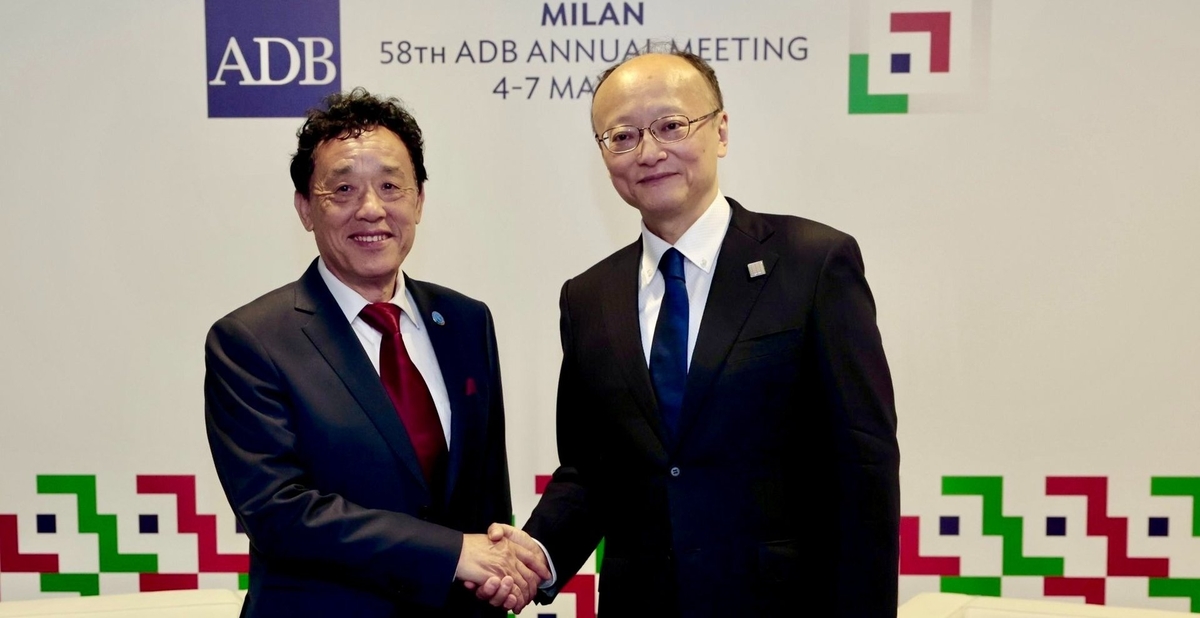January 2, 2026 | 05:53 GMT +7
January 2, 2026 | 05:53 GMT +7
Hotline: 0913.378.918
January 2, 2026 | 05:53 GMT +7
Hotline: 0913.378.918

FAO Director-General Qu Dongyu addresses the 58th Annual Meeting of the Asian Development Bank in Milan.
The Director-General of the Food and Agriculture Organization of the United Nations (FAO), Qu Dongyu, today took part in the 58th Annual Meeting of the Asian Development Bank (ADB) in Milan. He emphasised the need to strengthen cooperation to further the transformation of agrifood systems as the world faces a “critical juncture” in the fight against global hunger.
In his address to the meeting, Qu reminded the audience that, according to FAO’s latest State of Food Security and Nutrition in the World report, about 733 million people experienced hunger in 2023. Even more alarmingly, more than one-third of the global population, approximately 2.8 billion people, could not afford a healthy diet in 2022.
“We are at a critical juncture,” Qu said. “Around the world, we face complex and interconnected challenges that directly impact food security and access to healthy diets.”
The drivers of these challenges are well known: conflicts, economic disruptions, natural and man-made disasters, rising inequalities, and the growing frequency of climate-related shocks such as floods, droughts, and extreme weather events.
These setbacks have slowed progress toward achieving Zero Hunger and are making it harder to ensure that food is available, accessible, and affordable for all.
“To address these challenges and turn them into opportunities for all, we must take bold and coordinated action to transform global agrifood systems to be more efficient, more inclusive, more resilient, and more sustainable. This means rethinking how we produce, distribute, and consume food. Essentially it means producing more with less,” the Director-General said.
Such a transformation also requires money, and the ADB plays a key role in mobilizing the capital needed to help bridge the existing financing gap.
Since 1968, FAO and the ADB have collaborated on the design and implementation support of over 50 investment projects, amounting to over USD 2.6 billion in agrifood investments.
This partnership has produced tangible results. For example, in Indonesia, the Productivity Enhancement for Tree Crops Project improved smallholder incomes through better services and sustainable farming practices. In Bangladesh, the Northwest Crop Diversification Project has enabled farmers to shift to higher-value crops and gain better market access.
In Afghanistan, ADB was the first Multilateral Development Bank to re-engage following August 2021, mobilizing bold and innovative financing through the UN system. The ADB–FAO partnership demonstrates the impact of investing in emergency agricultural assistance in fragile and conflict-affected situations, enabling FAO to deliver assistance at scale, reaching over 800,000 rural households – 5.6 million people – in all 34 provinces.
United by a shared commitment to building efficient, inclusive, resilient and sustainable agrifood systems across Asia and the Pacific, FAO and the ADB are now entering a new partnership phase. By leveraging FAO’s technical expertise, field presence, and data capabilities alongside ADB’s financing instruments and private sector platforms, the parties aim to develop more and better public and private investment solutions at scale. FAO and the ADB will also work with countries to establish the enabling conditions needed to crowd-in finance and private investment into agrifood value chains.
“This collaboration also aligns with our broader efforts, such as the Pacific SIDS Investment Programme under the umbrella of the Hand-in-Hand Initiative, to promote high-quality investments that transform agrifood systems across the Asia-Pacific region,” Qu said.
It comes at a critical time for the region, which faces mounting challenges such as a higher frequency and intensity of climate events, inequality, fragility, and market volatility. The partnership reflects shared priorities along the FAO Four Betters to support country-driven transformation of agrifood systems, strengthen leadership in development finance, and foster public-private partnerships.
FAO’s participation at the ADB meeting was capped by the signing of a Framework Agreement to support the design and implementation of large-scale investments.
The agreement deepens the institutions’ 57-year-old partnership by setting in motion joint work in several key areas. These include advancing digital and AI-powered agricultural investment solutions across nine Central and South Asian countries to empower smallholders and build resilience; conducting in-depth economic and financial analyses to support nature-based and climate-smart investments in China, the Philippines, and Central Asia; and strengthening policy dialogue and investment planning to encourage inclusive public-private partnerships in countries such as Bangladesh, Pakistan, and Uzbekistan.
The signing ceremony took place in the presence of the FAO Director-General and ADB President Masato Kanda.
(FAO)

(VAN) From emissions cuts to energy sovereignty, France’s president reflects on COP21's legacy.

(VAN) A Yale University poll from earlier this month says most Americans see climate change as playing a role in hurting prices and the cost of living.

(VAN) According to the National Food and Strategic Reserves Administration, this year's autumn grain entered the market earlier and boasts good quality.

(VAN) The Trade Policy and Strategy Office (TPSO) under the Commerce Ministry reported that exports in November 2025 were worth US$27.445 billion, expanding for a 17th consecutive month at 7.1%.

(VAN) Ukraine’s leading poultry processor and exporter, MHP, plans to kick off a trial production of insect meal in the first quarter of 2026, as revealed by Serhiy Melnychuk, scientific advisor to the chairman of MHP.

(VAN) Researchers have warned of the unexpected consequences of extremely hot, humid conditions during pregnancy.

(VAN) A group of Iranian scientists from the National Institute of Genetic Engineering and Biotechnology claimed that they have developed a technology that allows effective processing of poultry feathers into meal using a Bacillus strain.